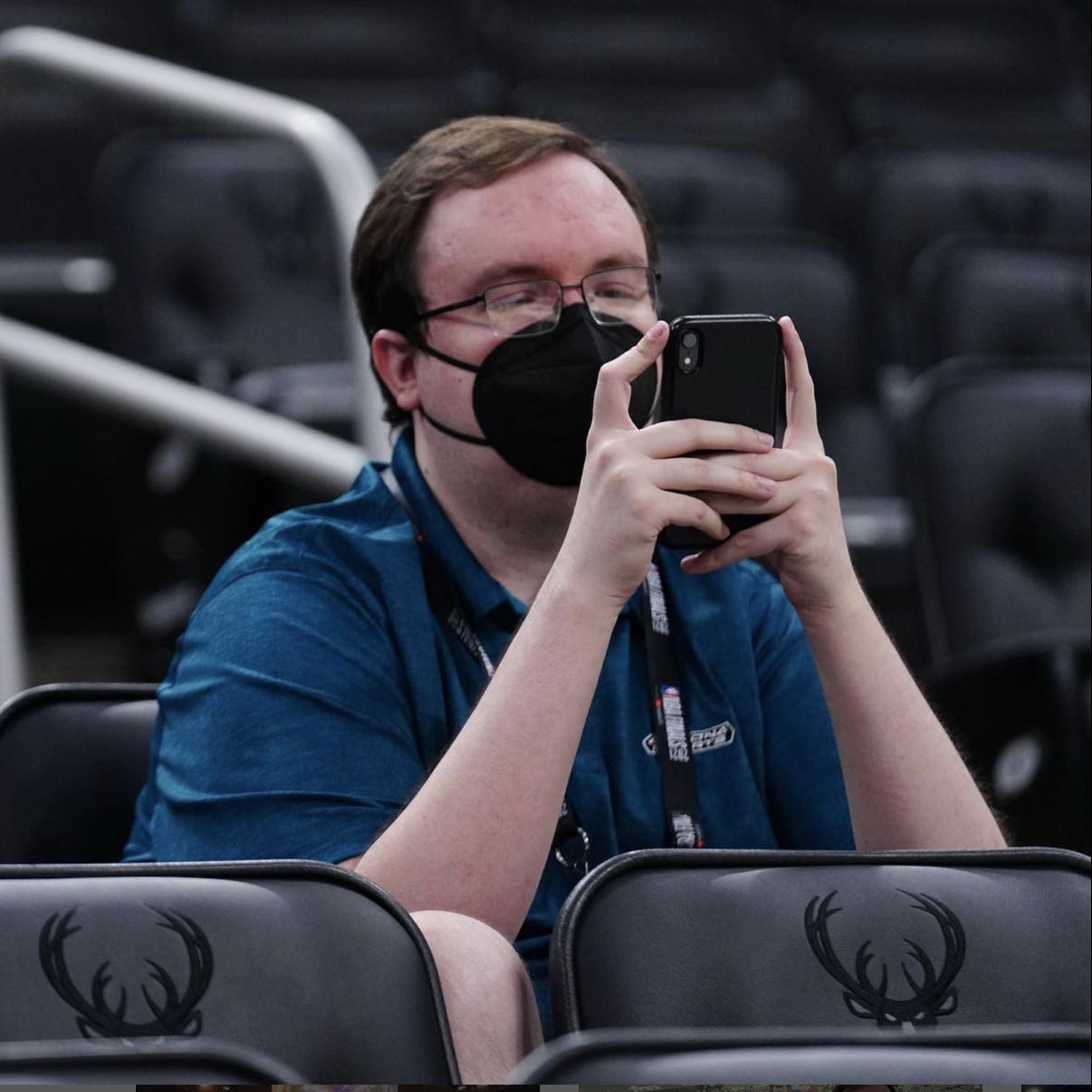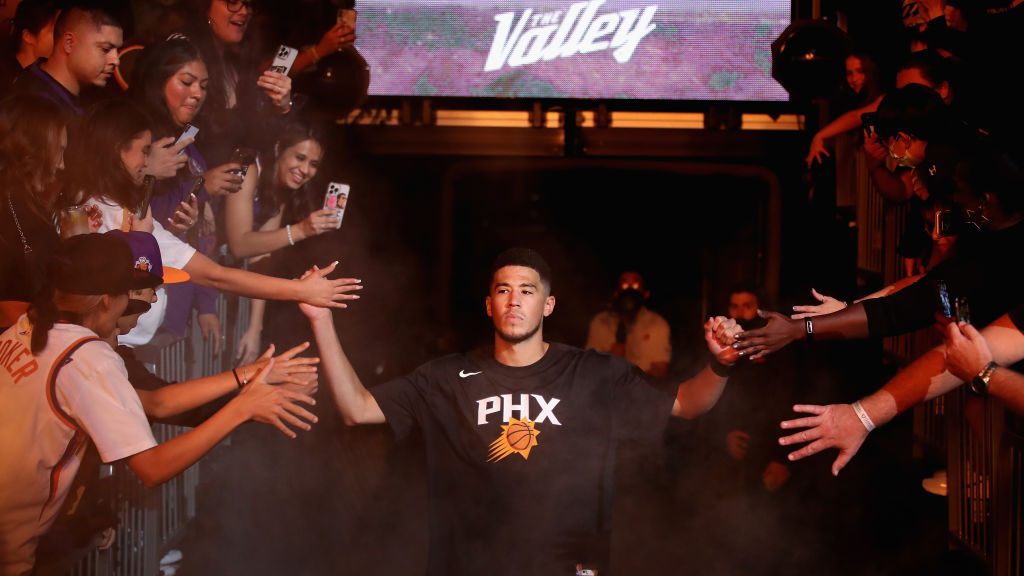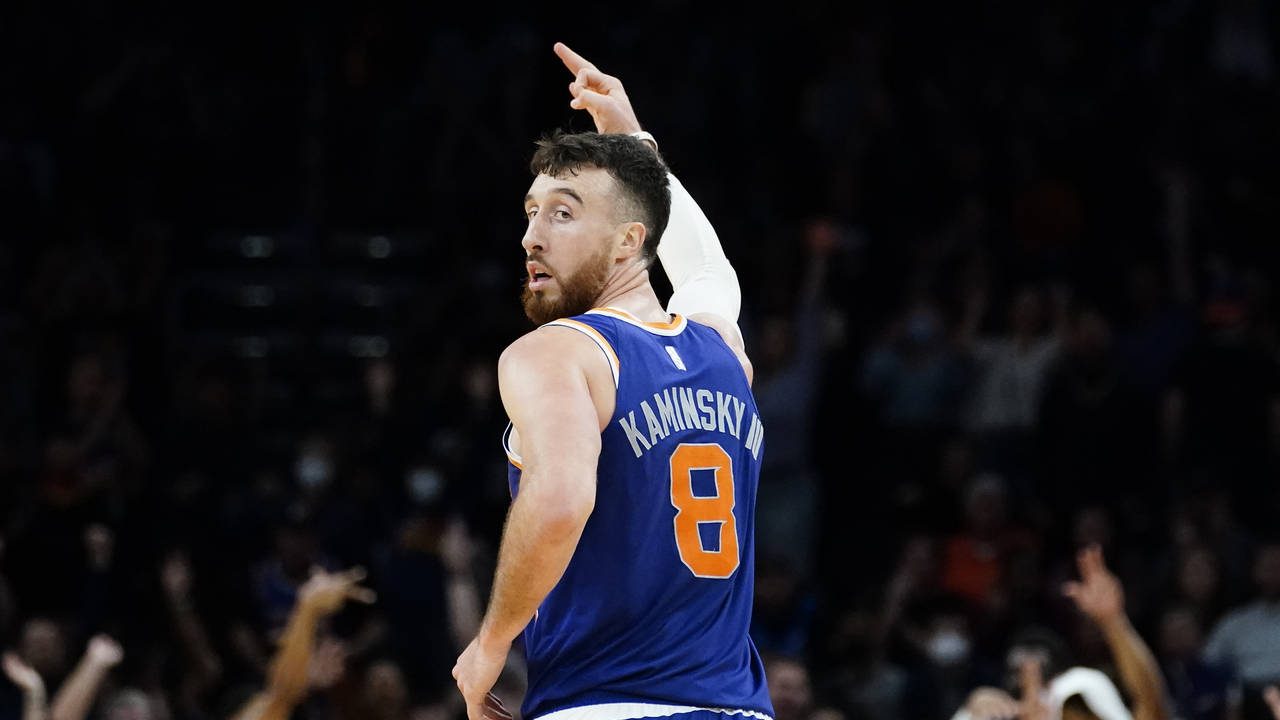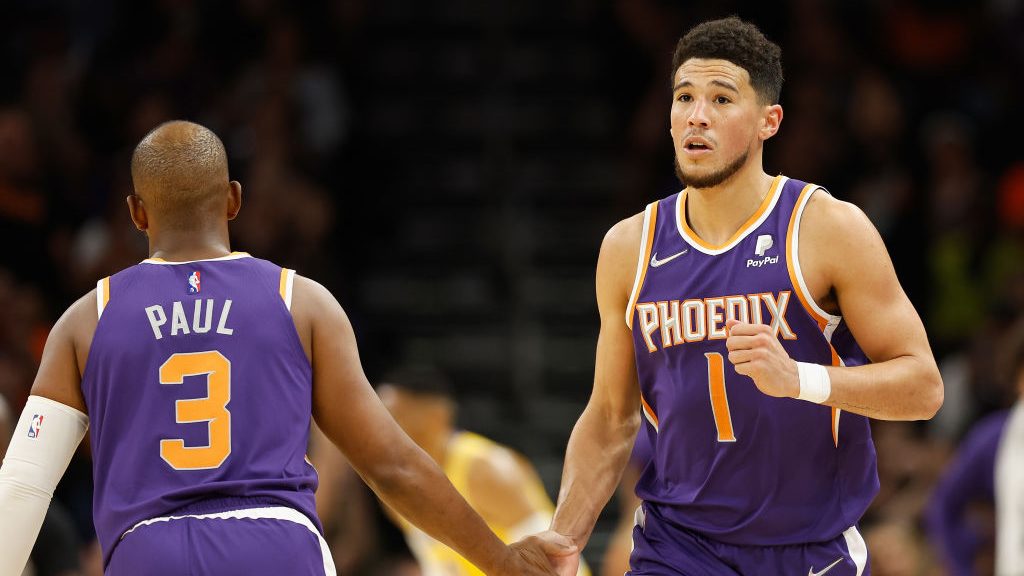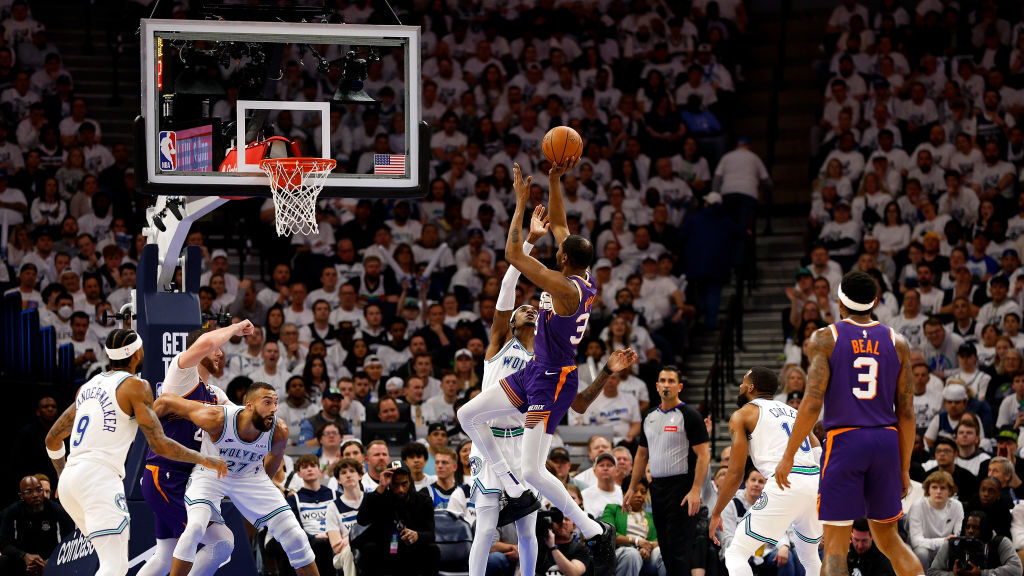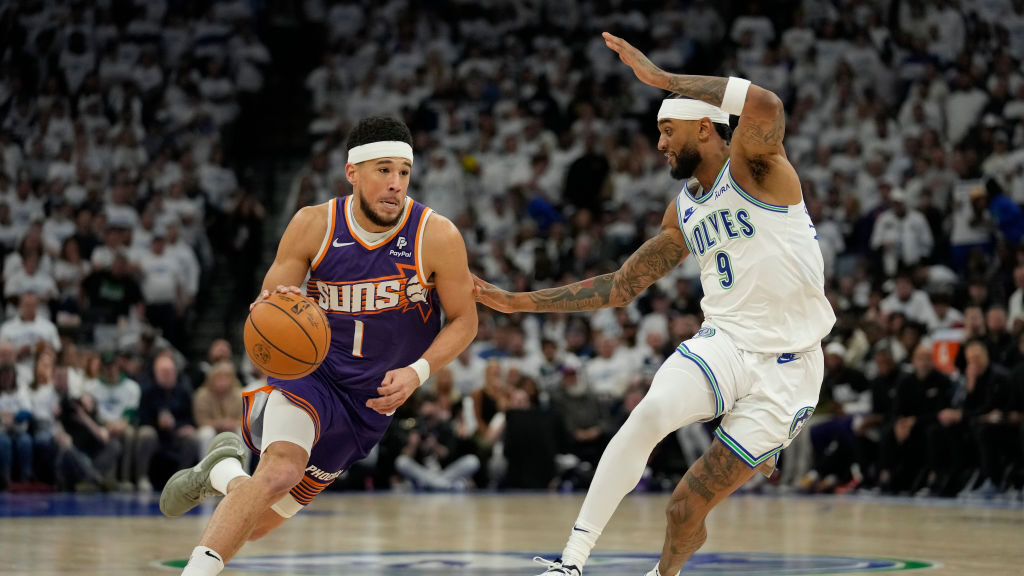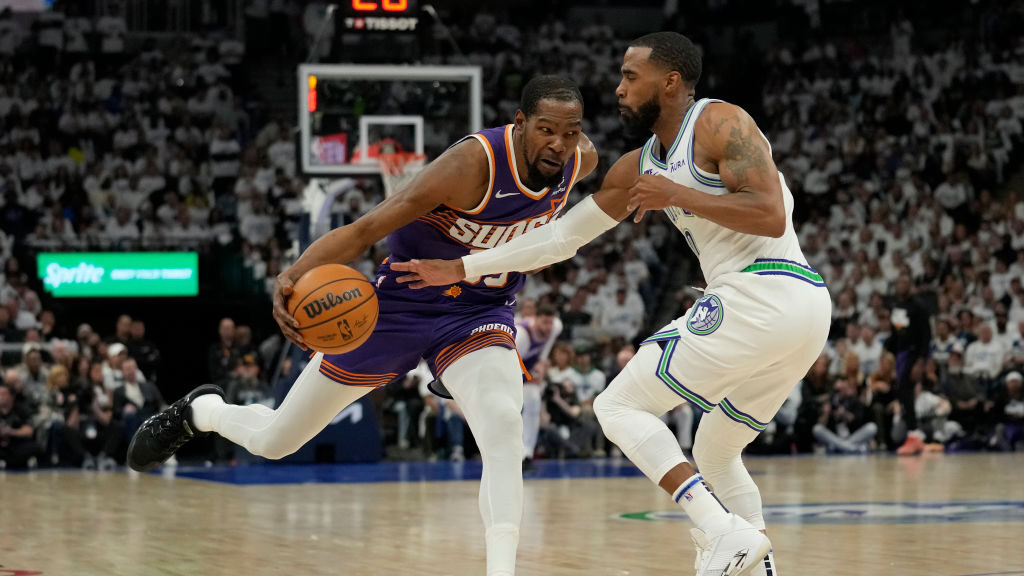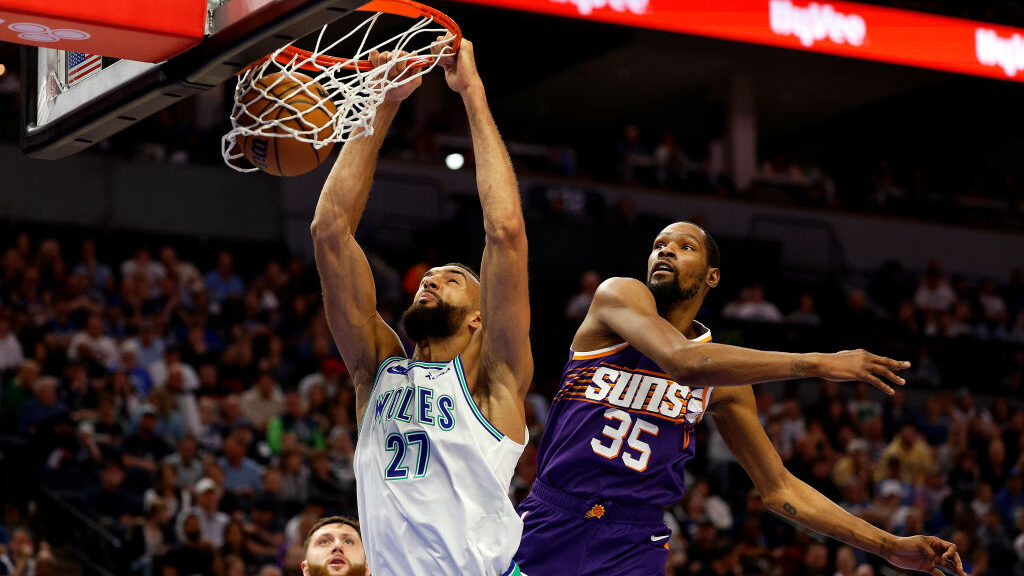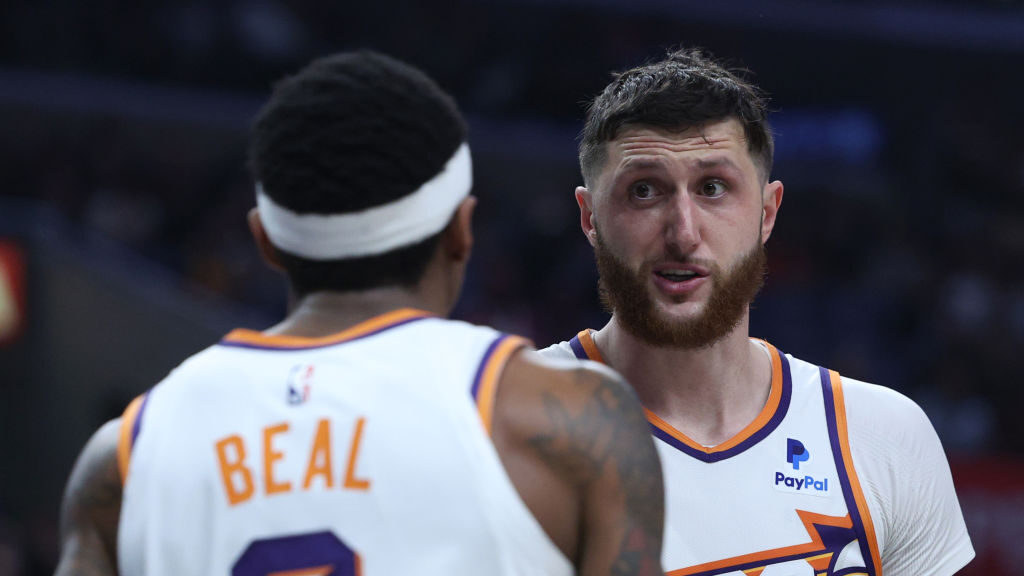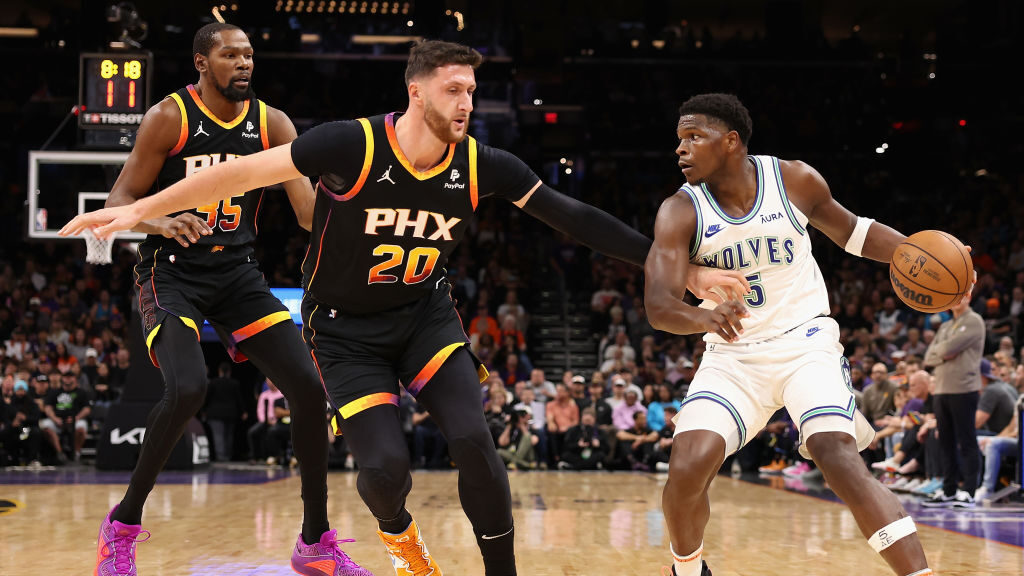Lessons learned from Suns’ 2021 postseason, Pt. 2: Booker, Ayton battle-tested
Apr 8, 2022, 7:08 AM | Updated: Apr 10, 2022, 7:44 pm
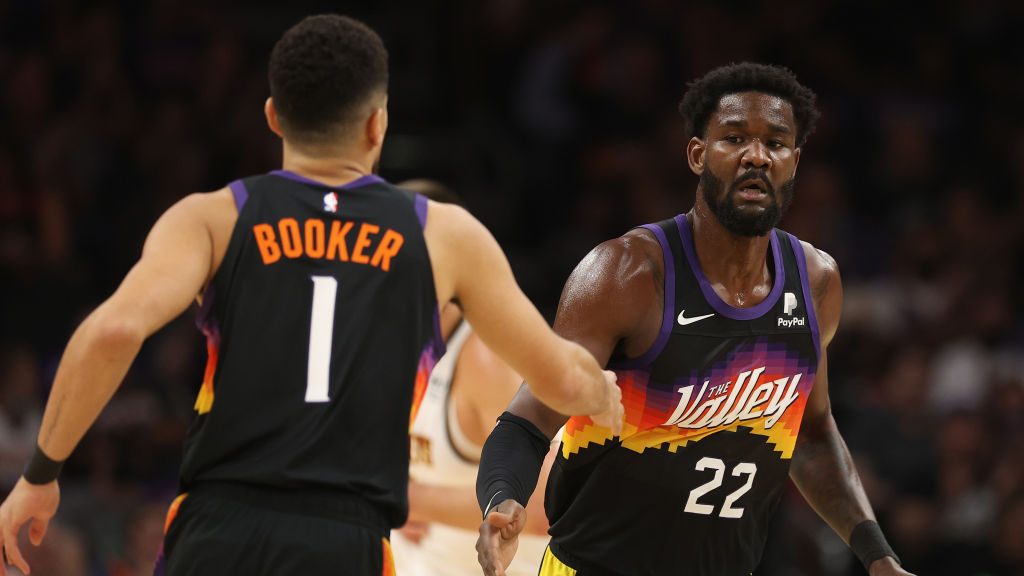
Deandre Ayton #22 of the Phoenix Suns high fives Devin Booker #1 during the first half of the NBA game at Footprint Center on October 20, 2021 in Phoenix, Arizona. (Photo by Christian Petersen/Getty Images)
(Photo by Christian Petersen/Getty Images)
Ahead of the Phoenix Suns’ second straight trip to the postseason, we will be taking a look back at last year’s run to the NBA Finals and what we can learn from it that should also apply to this season’s run.
After covering homecourt, now it’s about the Suns’ two main young pillars thriving in playoff basketball.
There was a (wrong) narrative that formed last season built around Chris Paul and the Phoenix Suns, loosely based on the idea that Paul was tied to everyone’s success.
You weren’t going to hear a ramble on a national platform about the team, Devin Booker, Deandre Ayton or Monty Williams without Paul’s name being intertwined somewhere into it.
This is no shot at Paul and his importance to the team. It would just sometimes unintentionally discredit what the Suns and some of their individuals had done on their own.
But what a few of those guys achieved during a run to the NBA Finals — one in which Paul wasn’t at 100% for — dismantled that notion fairly quickly. Last postseason established that Phoenix’s two other pillars of a “Big Three” will be more than ready for another long journey this year.
There was no way to know this for sure because it was Booker’s and Ayton’s first postseason. I wrote a year ago about how exceptionally rare it was for young and playoff-debuting starting lineups to go far. More often than not, it’s about learning what playoff basketball is really like and applying that to the next go.
Booker and Ayton, however, did that in real-time. It’s one of the most impressive feats in franchise history when you really zoom out and contextualize what both players, who were under 25 years old at the time, accomplished. We knew Paul would step up his game in these moments like the all-time greats do, but we learned that the young duo would as well.
Devin Booker puts together historical first postseason
To start with Booker, he used his lifelong fandom of the NBA to his advantage. Booker’s a borderline historian with his awareness of how the league works, and more importantly, what Hall of Famers’ career timelines looked like.
He studied playoff basketball and knew what to expect, preparing himself mentally for the increased levels of execution, intensity and physicality.
That clearly paid off.
Booker was a stud in the first round against the Los Angeles Lakers.
In Game 1, he dissected the Lakers’ first defensive gameplan for him with expert precision. His 34 points, seven rebounds and eight assists was the best playoff debut in franchise history. Paul sustained his shoulder injury in the early second quarter but Booker kept the Suns rolling while Paul played through it.
Once the adjustments from the Lakers set in for Game 2, Booker was hampered a bit. Through that, he still contributed in a big way by getting to the line 17 times and knocking down all 17 free tosses en route to 31 points.
Games 3 and 4 were where you started to see the inexperience show even more, and in a 2-2 series and the grim reaper of the 2010s LeBron James on the other side, it seemed like the Suns were in real trouble.
A hobbled James, though, was not the superstar to emerge in a pivotal Game 5. It was Booker, who scored 18 of his 30 points in the first quarter of a blowout.
Game 6 was Booker’s first elimination game, and it was no surprise to see someone who plays a ruthless style of basketball eviscerate his opponent in the game to send them home. Booker dropped 47 points, 33 of them coming in the first half. Eighteen of those were courtesy of six 3-pointers he drained in a first quarter that he outscored the Lakers by himself in (22-14).
Devin Booker drops an #NBAPlayoffs career-high 47 PTS (33 in 1st half), 8 3PM, helping the @Suns advance! #ThatsGame
PHX will take on DEN in the West Semis with Game 1 on Monday at 10pm/et on TNT. pic.twitter.com/PHE5Og3njM
— NBA (@NBA) June 4, 2021
The next round against the Denver Nuggets was more cut and dry. The Suns were the far superior team and were playing their best basketball of the season. They cruised in a four-game sweep, and Booker’s play reflected that.
As I wrote after a Game 1 win, Booker didn’t go supernova like three of the victories over the Lakers and didn’t need to. Booker grabbed 10 rebounds in Game 2 and another 11 in Game 4. He methodically scored the ball in the two road games, shooting a combined 22-of-48 (45.8%) for a total of 62 points while finding patches of the game and defense to attack when his opportunities were there. He shot 50.3% for the overall series.
Next came the Western Conference Finals, one in which Booker firmly cemented himself as one of the league’s superstars by recording a 40-point triple-double in Game 1. He shot 15-of-29 while Paul was out with COVID-19. It was only the third 40-point triple-double in the history of the conference finals.
Booker’s second half was remarkable. He scored or assisted 49 of the Suns’ 63 points.
The rest of the series was much more of a grind for Booker, hitting a real wall in the caliber of playoff defense he was getting from the Los Angeles Clippers while looking like he ran into a literal wall after breaking his nose in Game 2.
Booker did what he does rarely, scoring inefficiently. His field goal percentage of 37.1% for the series came while still bringing production at 25.5 points per game. As usual, Booker was still bringing it defensively and continued crashing the glass like he did in Denver with 5.8 a game against the Clippers.
Next came the NBA Finals, and Booker was sharp in the Suns’ first two games and wins. He provided 27 points in Game 1 before 31 two days later.
At that point, he was headed for Finals MVP. Then, in a Game 3 head coach Monty Williams later revealed Booker was dealing with a hamstring issue, Booker shot 3-of-14 in a loss.
At that point in the series, the wheels were starting to fall off for the Suns.
Fatigue was really kicking in, all of Paul’s ailments seemed to be catching up to him and the offense fell apart. That’s when Booker took it upon himself to carry that end of the floor, managing 42 and 40 points in Games 4 and 5 on 34-of-61 (55.7%) shooting. It still wasn’t enough to win either game, even with the bonkers level of shotmaking Booker was maintaining at the highest level of basketball.
It was curtains from there despite Booker setting the NBA record for most points by a player in their first postseason.
Ayton’s playoff switch-flip
Inside a Western Conference championship that was Booker’s rise to superstardom was Ayton playing the best basketball of his career, performances the Suns would have lost each series without.
Ayton was the hardest working player on the court in nearly every playoff game he competed in. He was flying up and down the court to give the Suns advantages in transition and mauling on the offensive glass to make the opposition earn each defensive rebound.
He did so in the first two rounds while facing some of the most challenging individual matchups possible: Lakers eight-time All-Star Anthony Davis and then Nikola Jokic, Nuggets star and the league’s reigning MVP.
Davis shot 11-of-29 (37.9%) when defended by Ayton, per NBA Stats.
Ayton’s ability to slide his feet and takes bumps with his chest showed resistance to two All-World players in areas off the dribble where they are used to getting an edge against most post defenders.
Ayton is not most post defenders.
Jokic was 24-of-59 (40.7%) with Ayton on him. Simply put, Ayton outplayed Jokic the whole series, a stunning development.
Crazily enough, that was not the most impressive feat of Ayton’s first foray into postseason basketball.
In Game 4 of the Western Conference Finals, an 84-80 rock fight that the Suns won, Ayton was absolutely out of this world defensively. It was a masterful showing of how to move in and out of space to affect offenses as the anchor. Clippers ball-handlers would find a little bit of daylight attacking the basket before Ayton was just there, either at the rim or before they got there.
Here’s an example of both:
Rewatch thread is probably gonna be mostly defensive possessions like this one pic.twitter.com/z0hX0irsLw
— Kellan Olson (@KellanOlson) June 28, 2021
When Los Angeles would go five-out, maximizing spacing, Ayton was hanging in there and even able to again disrupt the Clippers’ offense sometimes.
To maximize that, nine of Ayton’s 22 rebounds were offensive.
Williams after the game summed up Ayton’s impact.
“I thought Deandre’s presence, his effort, the rebounding, shot-blocking, his communication on defense, switching out on smaller guys and being able to guard them, he was the catalyst tonight on the defensive end,” Williams said. “I thought it was an unreal performance from him. Our guys rallied around him.
“He was all over the place tonight, that’s the kind of player that he can be,” Williams added. “He basically won that game for us tonight. He was tremendous.”
Ayton was great in the clincher of the series, a Game 6 outing of 16 points and 17 rebounds before dominating the interior of the Finals’ Game 1 with 22 points and 19 rebounds.
He faded from there, struggling like nearly anyone in basketball would have with defending Giannis Antetokounmpo. Ayton himself said this season that he wasn’t happy with how he played in that series.
The playoffs flat-out rule for so many different reasons.
One of them is that we get to weed out who is really about it. The real players are going to step up and play even better when the stakes can’t possibly get any higher. We have learned over decades and decades how some shine on these stages and some do not.
You can possess the strongest of presumptions on who files into which group, but you just never know until those lights are on. We now know where to classify Ayton and Booker, and it rightfully sets the expectations for what the Suns can accomplish this postseason even higher.

